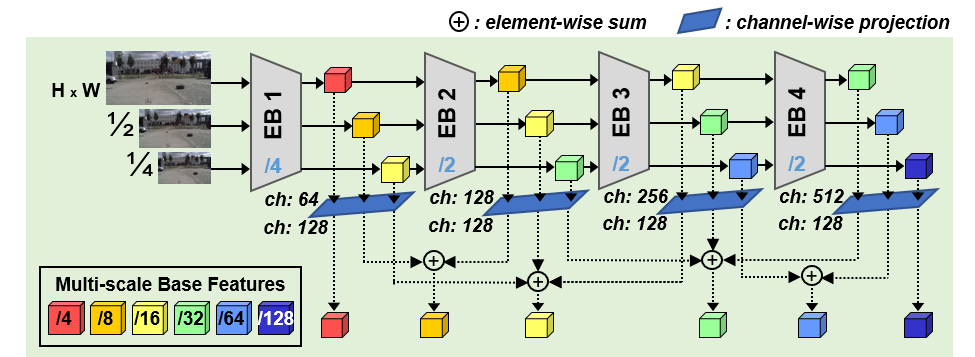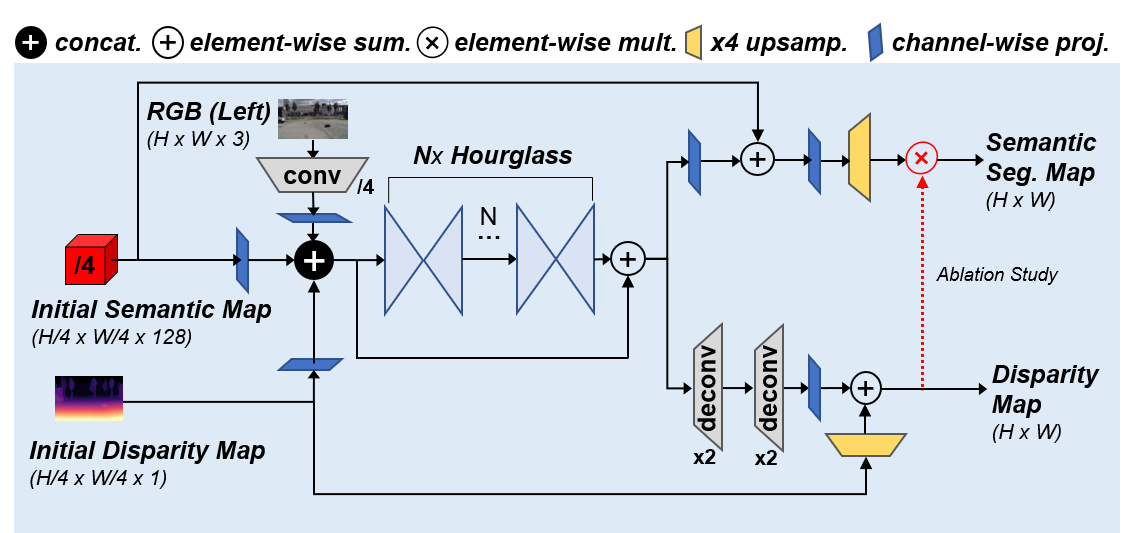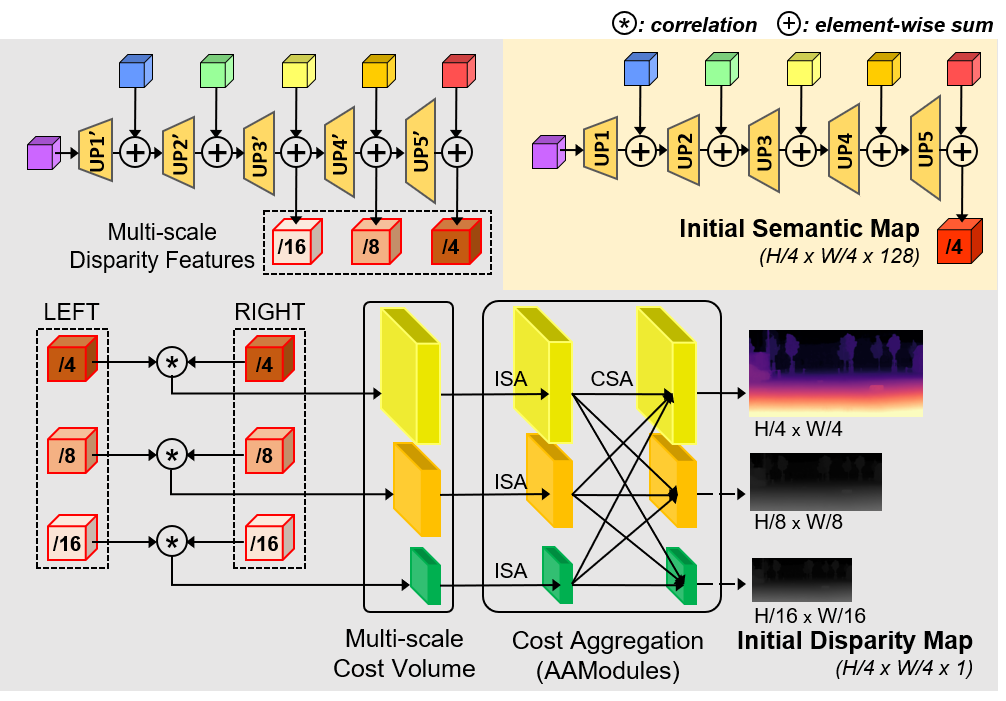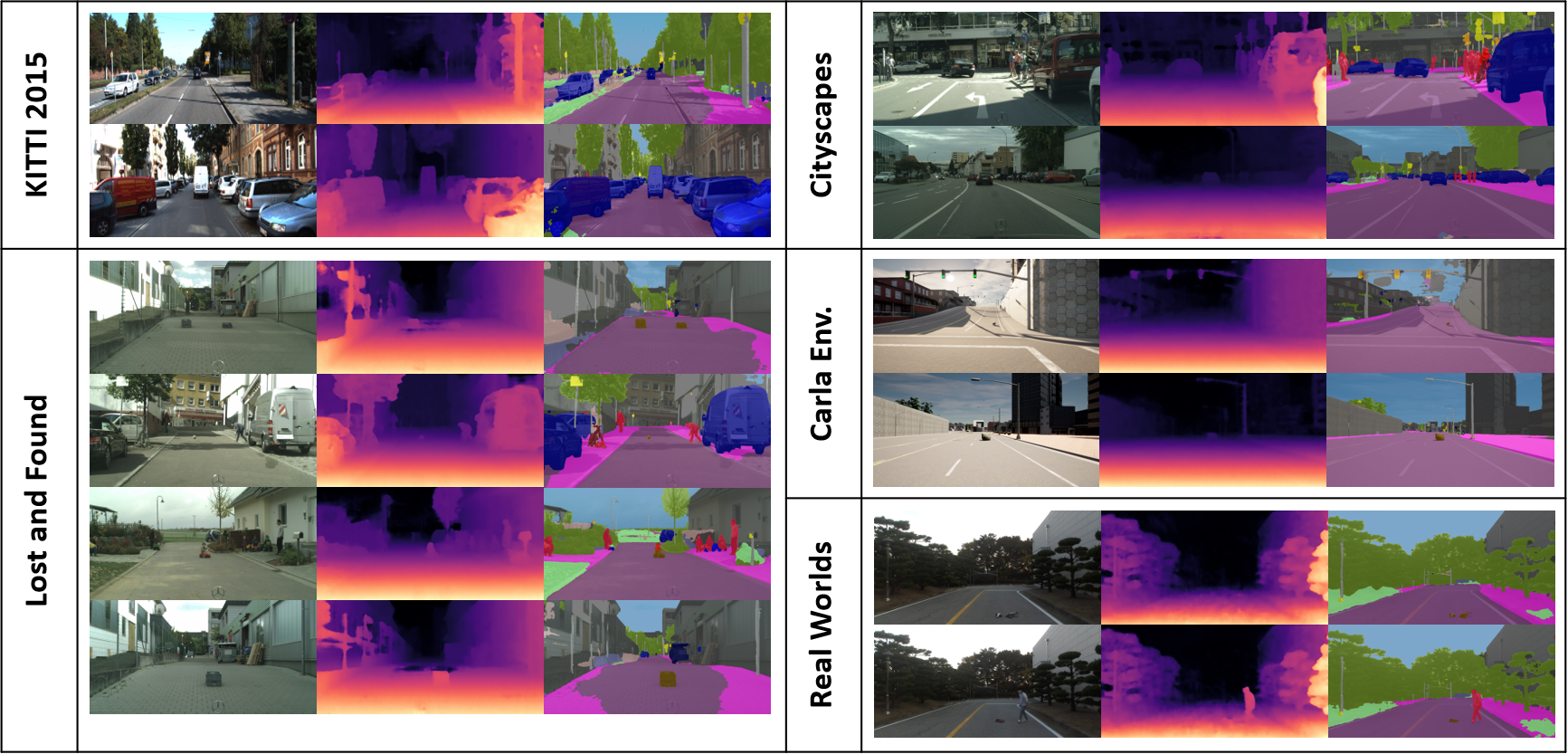RODSNet: End-to-end Real-time Obstacle Detection Network for Safe Self-driving via Multi-task Learning
This is the official PyTorch source code for the proposed end-to-end network for Real-time Obstacle Detection via Simultaneous Refinement Network (RODSNet). Below shows the overall network architecture.
Figure: Overview of the proposed end-to-end network architecture for class-agnostic obstacle detection. The network takes a pair of stereo RGB images to infer semantic segmentation and disparity map simultaneously, from which it detects unexpected small obstacles (in brown).
| Base Feature Extraction & Refinement Module | Initial Estimation of Semantic segmentation and Disparity prediction |
|---|---|
  |
 |
Base feature extraction (in green background): Intermediate features of the same scale are each summed to yield multi-scale base features of scales 1/4 , 1/8 , 1/16 , 1/32 , 1/64 , 1/128 . The network parameters are shared for both left and right RGB images. EB denotes an encoder backbone block.
Semantic segmentation (in yellow background): multi-scale features are successively upsampled to produce an initial semantic map estimate of 1/4 resolution of the original.
Disparity prediction (in gray background): we correlate the multi-scale disparity features of scales 1/4, 1/8, 1/16 and compute a multi-scale 3D cost volume, aggregate costs, and produce an initial disparity map estimate in three different resolutions. Grayscale maps are used only for training.
Refinement (in blue background): initial semantic and disparity maps, and the left RGB (reference) image are fed into Nx hourglass network, and then upsampled with skip connections. The effect of the red branch is studied in ablation.
- PyTorch 1.2.0
- CUDA 10.0
- Python 3.7 (recommended: Anaconda)
conda env create -f environment.yaml // set up a virtual environment
conda activate rodsnet // activate the environment
cd network/deform_conv && bash build.sh // build deformable convolutionTo detect objects of both class-agnostic obstacle class (from Lost and Found) and the set of 19 annotated classes (from Cityscapes), we created a city_lost directory by our multi-dataset fusion approach. Our folder structure is as follows:
Click to see the directory structure
datasets
└── sceneflow
│ ├── Driving
│ │ ├── disparity
│ │ └── frames_finalpass
│ ├── FlyingThings3D
│ │ ├── disparity
│ │ └── frames_finalpass
│ └── Monkaa
│ ├── disparity
│ └── frames_finalpass
├── kitti_2012
│ ├── training
│ │ ├── colored_0
│ │ ├── colored_1
│ │ └── disp_occ
│ └── testing
│ ├── colored_0
│ └── colored_1
├── kitti_2015
│ ├── training
│ │ ├── image_2
│ │ ├── image_3
│ │ ├── disp_occ_0
│ │ └── semantic
│ └── testing
│ ├── image_2
│ └── image_3
└── cityscapes
| ├── leftImg8bit
| ├── rightImg8bit
| ├── disparity
| └── gtFine
| ├── train
| ├── val
| └── test
└── city_lost
├── leftImg8bit
| ├── train
| | ├── 01_Hanns_Klemm_Str_45
| | ├── 03_Hanns_Klemm_Str_19
| | ├── ...
| | └── zurich
| └── val
| ├── 02_Hanns_Klemm_Str_44
| ├── 04_Maurener_Weg_8
| ├── ...
| └── munster
├── rightImg8bit
| ├── same structure with leftImg8bit
├── disparity
| ├── same structure with leftImg8bit
└── gtFine
| ├── train
| | ├── aachen
| | ├── bochum
| | ├── ...
| | └── zurich
| └── val
| ├── frankfurt
| ├── lindau
| └── munster
└── gtCoarse
├── train
| ├── 01_Hanns_Klemm_Str_45
| ├── 03_Hanns_Klemm_Str_19
| ├── ...
| └── 14_Otto_Lilienthal_Str_24
└── val
├── 02_Hanns_Klemm_Str_44
├── 04_Maurener_Weg_8
├── ...
└── 15_Rechbergstr_Deckenpfronn
Download all pretrained models here and place them under the $RODSNet/ckpt.
Detailed commands for training and evaluation are described in script/train_test_guide.txt.
Change the dataset's root directory by using --data_root [$DATA_ROOT] commands.
For training our RODSNet-2x on city_lost datasets:
python main.py --gpu_id 0 --dataset city_lost --model resnet18 --checkname resnet18_train_refine_new18 \
--optimizer_policy ADAM --lr 4e-4 --weight_decay 1e-4 --epochs 400 \
--with_refine --refinement_type new18 \
--batch_size 4 --val_batch_size 4 \
--train_semantic --train_disparity \
--resume ckpt/sceneflow/best_disp_model/epe_best_checkpoint.pth --transfer_disparity \
--epsilon 1e-1Trained results are saved in $RODSNet/run/[dataset]/[checkname]/experiment_0/ directory.
To evaluate our performance on city_lost dataset with pretrained results:
RODSNet-1x :
python main.py --gpu_id 0 --dataset city_lost --checkname city_lost_test_RODSNet_1x \
--with_refine --refinement_type ours --val_batch_size 1 --train_semantic --train_disparity --epsilon 1e-1 \
--resume ckpt/city_lost/RODSNet_1x/score_best_checkpoint.pth --test_onlyRODSNet-2x :
python main.py --gpu_id 0 --dataset city_lost --checkname city_lost_test_RODSNet_2x \
--with_refine --refinement_type new18 --val_batch_size 1 --train_semantic --train_disparity --epsilon 1e-1 \
--resume ckpt/city_lost/RODSNet_2x/score_best_checkpoint.pth --test_onlyFor fast inference, evaluation is run without saving the intermediate results. (To save any results, add --save_val_results option. The output results will then be saved in $RODSNet/run/[dataset]/[checkname]/experiment_0/results folder.)
You can test our pre-trained RODSNet-2x performances without downloading huge datasets using the commands below. The results will be saved in samples/results folder.
python3 sample_test.py --gpu_id 0 \
--with_refine \
--refinement_type new18 \
--train_disparity --train_semantic \
--resume ckpt/city_lost/RODSNet_2x/score_best_checkpoint.pthSample results of pre-trained RODSNet-2x which are tested on various environments (KITTI, Lost and Found, Cityscapes, CARLA Simulation and real world) in the directory samples/RODSNet-2x_results.
-
This work was supported by the Institute for Information & Communications Technology Promotion (IITP)grant funded by the Korea government (MSIT) (No.2020-0-00440, Development of Artificial Intelligence Technology that Continuously Improves Itself as the Situation Changes in the Real World).
-
Parts of the code are adopted from previous works (AANet, and RFNet). We appreciate the original authors for their awesome repos.
@article{songjeong2022rodsnet,
author = {Song, Taek-jin* and Jeong, Jongoh* and Kim, Jong-Hwan},
title = {End-to-end Real-time Obstacle Detection for Safe Self-driving via Multi-task Learning},
year = {2022},
doi = {10.1109/TITS.2022.3149789},
URL = {https://doi.org/10.1109/TITS.2022.3149789},
journal = {IEEE Transactions on Intelligent Transportation Systems}
}





